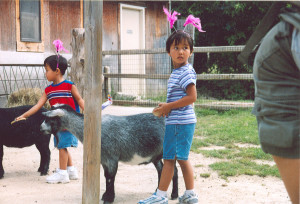Not again.
Public Health England are investigating cases of gastrointestinal illness after a lamb feeding event at a farm shop and outlet village in South Ribble.
 To date we are aware of 11 laboratory confirmed cases of E. coli O157. Four people have been hospitalised with complications arising from the infection – one of whom has now left hospital and is recovering at home.
To date we are aware of 11 laboratory confirmed cases of E. coli O157. Four people have been hospitalised with complications arising from the infection – one of whom has now left hospital and is recovering at home.
All cases had visited a lamb feeding event at Huntley’s Country Store, near Salmesbury in South Ribble over recent weeks. There is no longer any risk to the public as all contact between animals and the public at the premises has now ceased.
From North Carolina, U.S. to Brisbane, Australia, outbreaks of E. coli, Salmonella and other pathogens related to petting zoos or animal exhibits have been devastating to the families involved.
We wanted to provide a checklist for parents, and the teachers who book these events.
Two veterinarians from Kansas State University – Gonzalo Erdozain who completed his Masters of Public Heath with me and is about to graduate as a vet, and Kate KuKanich, an assistant prof with whom I’ve had the pleasure
of writing several papers with – joined with me and my BFF Chapman (until we have a fight over hockey) and we tried to produce some guidelines.
The uniting factor was – we all have kids.
We’ve all seen microbiologically terrible practices, and read about them from around the world, and thought, maybe we should try and provide some guidance.
Fourty-nine people got sick from E. coli O157 at the EKKA last year, the equivalent of the Texas state fair in Brisbane.
There has been no follow-up report.
North Carolina has had repeated and terrible outbreaks.
As a father of five daughters, I’ve had many requests over 20 years to go on a school trip to see the animals. As a food safety type, I’ve been routinely concerned about best practices. The other parents may dislike microbiology, but I’m concerned with the health and safety of the children involved.
Best practices for planning events encouraging human-animal interactions
03.Apr.14
Zoonoses and Public Health DOI: 10.1111/zph.12117
G. Erdozain , K. KuKanich , B. Chapman and D. Powell
03.Apr.14
Zoonoses and Public Health
G. Erdozain , K. KuKanich , B. Chapman and D. Powell
http://onlinelibrary.wiley.com/doi/10.1111/zph.12117/abstract?deniedAccess
Educational events encouraging human–animal interaction include the risk of zoonotic disease transmission. ‘It is estimated that 14% of all disease in the USA caused by Campylobacter spp., Cryptosporidium spp., Shiga toxin-producing Escherichia coli (STEC) O157, non-O157 STECs, Listeria monocytogenes, nontyphoidal Salmonella enterica and Yersinia enterocolitica were attributable to animal contact. This article reviews best practices for organizing events where human–animal interactions are encouraged, with the objective of lowering the risk of zoonotic disease transmission.
